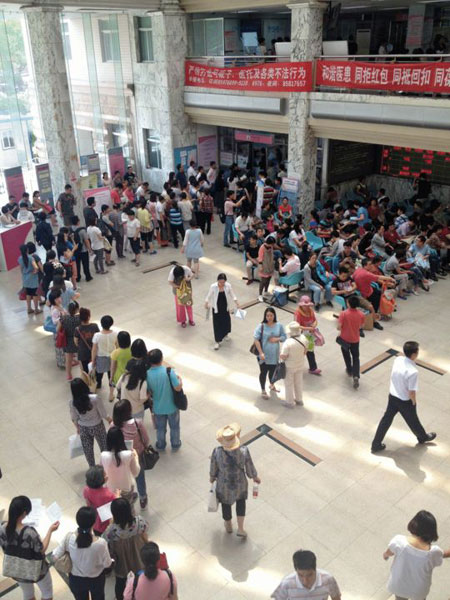 |
|
People wait in queue for registration at a hospital. [File photo/sohu.com] |
A direct consequence of the policy is a sharp increase in pregnant mothers queuing up at hospitals, which is causing hospitals to run short of 'record slots'.
In China, 'setting record' is the main procedure for admitting pregnant women, which is a method obstetrics departments use to evaluate their medical resources in order to decide how many pregnant women they can admit. 'Setting record' is thus a guarantee of available beds for prenatal examination and delivery.
The Beijing Times reports that multiple Beijing hospitals have announced their 'record slots' have already been filled up to April 2017.
The situation at other hospitals is also not encouraging, and some people who have already set their records are also finding it difficult to register.
A local woman with the surname Wei arrived at a hospital with her husband at midnight and did not receive treatment until the next day.
"They (hospital) release only one number every day and there is no chance to get registered," said a man at the head of the queue, hearing Wei complain.
However, the journalist saw this man, who latter got his turn, handing his number and a social security card to a pregnant woman, who was accompanied by a woman wearing a cap.
The journalist learnt that most people waiting knew the man was a scalper but did not dare stop him.
The man said he scalped as a part-time job in Beijing and was hired by the woman in the cap.
The woman in the cap, told the journalist her service was very cheap and she could help 'set a record' by pulling some strings at the hospital, for 10,000 yuan ($1497.4 dollar) in return.
The journalist later discovered some people went to hospitals in Yanjiao in east Beijing for their delivery care. One of them with the surname Duan said she turned to Yanjiao after giving up on downtown hospitals and she surprisingly set her record in Yanjiao without too much of a wait.
Faced with such issues, the Beijing branch of the China's Health and Family Planning Commission plans to report the number of available beds at hospitals weekly so that people can learn where to set their records at community health service centers.
In addition, the local government may also buy private obstetrics services to alleviate the shortage of medical resources.
Hospital management expert Zuo Lian said the scalping cannot be easily eradicated as the hospitals have no authority for law enforcement. Zuo added that promoting the transparency of the record-setting system is perhaps the best way to fight scalping.
